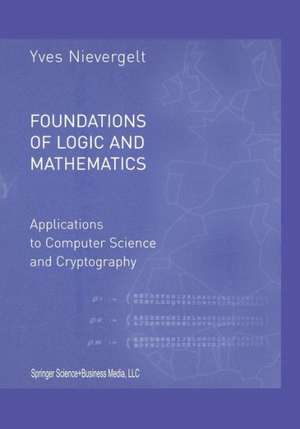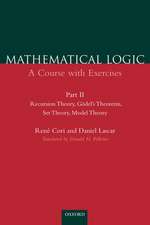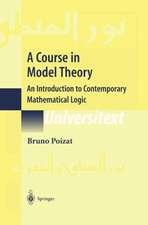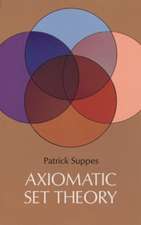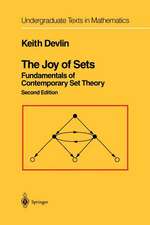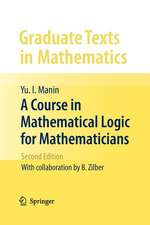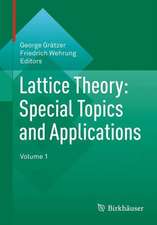Foundations of Logic and Mathematics: Applications to Computer Science and Cryptography
Autor Yves Nievergelten Limba Engleză Paperback – 13 oct 2012
| Toate formatele și edițiile | Preț | Express |
|---|---|---|
| Paperback (1) | 402.38 lei 6-8 săpt. | |
| Birkhäuser Boston – 13 oct 2012 | 402.38 lei 6-8 săpt. | |
| Hardback (1) | 418.50 lei 38-44 zile | |
| Birkhauser – 25 noi 2001 | 418.50 lei 38-44 zile |
Preț: 402.38 lei
Nou
Puncte Express: 604
Preț estimativ în valută:
76.99€ • 80.39$ • 63.72£
76.99€ • 80.39$ • 63.72£
Carte tipărită la comandă
Livrare economică 05-19 aprilie
Preluare comenzi: 021 569.72.76
Specificații
ISBN-13: 9781461266235
ISBN-10: 1461266238
Pagini: 438
Ilustrații: XVI, 415 p.
Dimensiuni: 178 x 254 x 25 mm
Greutate: 0.75 kg
Ediția:2002
Editura: Birkhäuser Boston
Colecția Birkhäuser
Locul publicării:Boston, MA, United States
ISBN-10: 1461266238
Pagini: 438
Ilustrații: XVI, 415 p.
Dimensiuni: 178 x 254 x 25 mm
Greutate: 0.75 kg
Ediția:2002
Editura: Birkhäuser Boston
Colecția Birkhäuser
Locul publicării:Boston, MA, United States
Public țintă
ResearchCuprins
A Theory.- 0 Boolean Algebraic Logic.- 1 Logic and Deductive Reasoning.- 2 Set Theory.- 3 Induction, Recursion, Arithmetic, Cardinality.- 4 Decidability and Completeness.- B Applications.- 5 Number Theory and Codes.- 6 Ciphers, Combinatorics, and Probabilities.- 7 Graph Theory.
Recenzii
From the reviews:
"The book under review covers the topics which can usually be found in textbooks of discrete mathematics for students in computer science or mathematics (Boolean logic, predicate calculus, sets and functions, induction, integers, rational numbers, cardinality, modular arithmetic, cryptography, combinatorics, probability, graphs) as well as more advanced topics in mathematical logic (intuitionistic logic, transfinite induction). While the range of topics is relatively standard, the way they are presented is highly original. The author has chosen a strictly formal and axiomatic approach. All the results are proved in full detail from first principles . . . remarkably, all the arithmetic laws on the rational numbers are proved, step after step, starting from the very definitions! . . . a valuable reference text and a useful companion for anybody wondering how the basic mathematical concepts can be rigorously developed within set theory. The author has managed to combine the foundational approach with a careful treatment of many applications. More than 1000 exercises complete the text. ...All the results are proved in full detail from first principles...remarkably, the arithmetic laws on the rational numbers are proved, step after step, starting from the very definitions!...This is a valuable reference text and a useful companion for anybody wondering how basic mathematical concepts can be rigorously developed within set theory."
—MATHEMATICAL REVIEWS
"In order to give an idea of the originality of this book in combining theoretical and applied issues, having a source in everyday life and a strong impact on civilization, let us mention that the first section of Part A includes a typology of proofs and of theorems. The section on induction includes arithmetic in finance. The section on decidability includes a chapter on automatic theorem proving. Section 6 in Part B describes the Enigma machines: howthe German machine cipher was broken and how it was read by the Allies in World War Two. Rigorous and modern in its theoretical aspect, attractive as a detective novel in its applied aspects, this paper book deserves the attention of both beginners and advanced students in mathematics, logic and computer sciences as well as in social sciences."
---Zentralblatt MATH
“This book could serve as a text and as a reference; it has a different presentation style. … The book is divided in two parts; Part A is titled Theory and Part B Applications. It has a five and a half page bibliography, and a 13 page extensive index. … The book provides detailed coverage of topics on Logic and Mathematics. The two part presentation of theory and applications is well thought out. … the exercises provided are exhaustive.” (Saif Terai, The Book Review Column, 2011)
"The book under review covers the topics which can usually be found in textbooks of discrete mathematics for students in computer science or mathematics (Boolean logic, predicate calculus, sets and functions, induction, integers, rational numbers, cardinality, modular arithmetic, cryptography, combinatorics, probability, graphs) as well as more advanced topics in mathematical logic (intuitionistic logic, transfinite induction). While the range of topics is relatively standard, the way they are presented is highly original. The author has chosen a strictly formal and axiomatic approach. All the results are proved in full detail from first principles . . . remarkably, all the arithmetic laws on the rational numbers are proved, step after step, starting from the very definitions! . . . a valuable reference text and a useful companion for anybody wondering how the basic mathematical concepts can be rigorously developed within set theory. The author has managed to combine the foundational approach with a careful treatment of many applications. More than 1000 exercises complete the text. ...All the results are proved in full detail from first principles...remarkably, the arithmetic laws on the rational numbers are proved, step after step, starting from the very definitions!...This is a valuable reference text and a useful companion for anybody wondering how basic mathematical concepts can be rigorously developed within set theory."
—MATHEMATICAL REVIEWS
"In order to give an idea of the originality of this book in combining theoretical and applied issues, having a source in everyday life and a strong impact on civilization, let us mention that the first section of Part A includes a typology of proofs and of theorems. The section on induction includes arithmetic in finance. The section on decidability includes a chapter on automatic theorem proving. Section 6 in Part B describes the Enigma machines: howthe German machine cipher was broken and how it was read by the Allies in World War Two. Rigorous and modern in its theoretical aspect, attractive as a detective novel in its applied aspects, this paper book deserves the attention of both beginners and advanced students in mathematics, logic and computer sciences as well as in social sciences."
---Zentralblatt MATH
“This book could serve as a text and as a reference; it has a different presentation style. … The book is divided in two parts; Part A is titled Theory and Part B Applications. It has a five and a half page bibliography, and a 13 page extensive index. … The book provides detailed coverage of topics on Logic and Mathematics. The two part presentation of theory and applications is well thought out. … the exercises provided are exhaustive.” (Saif Terai, The Book Review Column, 2011)
Descriere
Descriere de la o altă ediție sau format:
This modem introduction to the foundations of logic, mathematics, and computer science answers frequent questions that mysteriously remain mostly unanswered in other texts: • Why is the truth table for the logical implication so unintuitive? • Why are there no recipes to design proofs? • Where do these numerous mathematical rules come from? • What are the applications of formal logic and abstract mathematics? • What issues in logic, mathematics, and computer science still remain unresolved? Answers to such questions must necessarily present both theory and significant applica tions, which explains the length of the book. The text first shows how real life provides some guidance for the selection of axioms for the basis of a logical system, for instance, Boolean, classical, intuitionistic, or minimalistic logic. From such axioms, the text then derives de tailed explanations of the elements of modem logic and mathematics: set theory, arithmetic, number theory, combinatorics, probability, and graph theory, with applications to computer science. The motivation for such detail, and for the organization of the material, lies in a continuous thread from logic and mathematics to their uses in everyday life.
This modem introduction to the foundations of logic, mathematics, and computer science answers frequent questions that mysteriously remain mostly unanswered in other texts: • Why is the truth table for the logical implication so unintuitive? • Why are there no recipes to design proofs? • Where do these numerous mathematical rules come from? • What are the applications of formal logic and abstract mathematics? • What issues in logic, mathematics, and computer science still remain unresolved? Answers to such questions must necessarily present both theory and significant applica tions, which explains the length of the book. The text first shows how real life provides some guidance for the selection of axioms for the basis of a logical system, for instance, Boolean, classical, intuitionistic, or minimalistic logic. From such axioms, the text then derives de tailed explanations of the elements of modem logic and mathematics: set theory, arithmetic, number theory, combinatorics, probability, and graph theory, with applications to computer science. The motivation for such detail, and for the organization of the material, lies in a continuous thread from logic and mathematics to their uses in everyday life.
